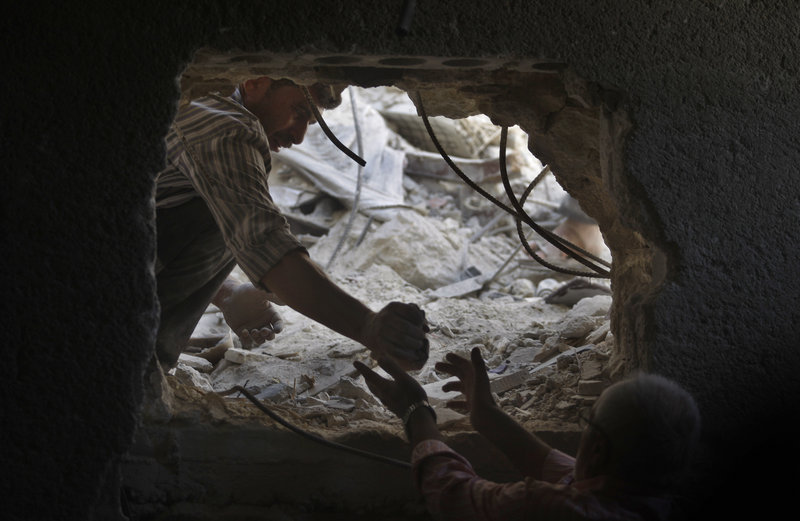ALEPPO, Syria – A brief lull in fighting for a Muslim holiday Sunday allowed residents of Aleppo to take stock of their losses after three weeks of intense battles left many in Syria’s largest city strapped for cash, separated from loved ones and scared of more violence ahead.
In the capital, Damascus, President Bashar Assad prayed at a mosque in his first appearance in public since a bomb attack killed four of his top security advisers July 18.
Thousands across the country marched against Assad in mosques and cemeteries after special dawn prayers marking the start of the three-day Eid al-Fitr holiday, which caps the holy month of Ramadan.
The holiday — usually a joyful time to remember the dead, dress up in new clothes and visit family — followed a particularly bloody Ramadan when fighting erupted in Syria’s two largest cities, bringing large civilian populations under fire and causing a spike in the death toll.
“There is no holiday,” said Mohammed Radwan, 34, standing near an apartment building in Aleppo’s Tariq al-Bab neighborhood, which was hit by an airstrike the day before. “The electricity comes and goes, the jets fire on us and no one has any work. All we’ll do today is clean up the rocks and rubble.”
Nearby, a group of men coated in gray cement dust searched the wreckage of the strike for the bodies of two young girls, ages 2 and 14.
The fighting in Aleppo has marked the first time that Assad has relied heavily on air power to bomb and strafe rebel forces who have grown adept at challenging ground troops. The poorly armed opposition fighters are largely helpless against near-daily airstrikes by attack helicopters and fighter jets, and the attacks often kill or terrify civilians. As many as 200,000 have fled Aleppo, either to nearby villages or to refugee camps in Turkey.
But after three weeks of battle, the government has still not managed to defeat the rebels — a sign of the regime’s loosening grip on the country.
An airstrike Wednesday that killed more than 40 people cast a pall over holiday prayers in the town of Azaz near the Turkish border. Only about 100 men showed up to pray in the Hadideen mosque with its salmon-colored minaret bearing the scars of a shell blast.
Residents said many families fled the town after the strike. Others packed up blankets and mats to camp out in the olive groves around town, fearing another attack on the holiday.
“We should all be wearing new clothes and be freshly groomed, but look at us,” said Abdullah Sayid, pointing to his own stubbly chin and the glum faces of the men around him. “Nobody feels like it.”
His younger brother Abdel-Hafiz, 32, was killed in the airstrike.
A similar mood permeated rebel-held neighborhoods of Aleppo, many of which have been subjected to heavy shelling and bombings that have damaged buildings and forced civilians to flee.
The airstrike in Tariq al-Bab that killed the two girls also collapsed part of Zakariya Qadi’s apartment. He stood on the street while men upstairs salvaged what they could of his belongings, throwing mattresses, rugs and bundles of clothing from the balcony onto the pavement.
The 28-year-old barber said he had sent his wife and two young boys to a village outside the city and was staying at his father’s house to protect it from thieves.
“Last year, we were able to eat and be together and celebrate,” he said as a friend slowly lowered his microwave oven, hanging from a rope. “Now we are separated and our home is wrecked.”
Many Aleppo residents say the huge changes have left them confused. Aleppo, a city of some 3 million people spread around a cobblestone old city and medieval citadel, has long been considered one of the most beautiful spots in what was a very safe country.
Some were torn between their distrust of the mostly rural rebels and their anger at the government for its shelling and airstrikes.
“The events have really hurt the people, especially the poor,” said Fares Munir, a 39-year-old tailor sitting with friends in one of the few open shops in the Shaar neighborhood.
“We hoped that the government would protect us when the armed groups came in. But it didn’t, and now it is shelling us along with them.”
Send questions/comments to the editors.



Success. Please wait for the page to reload. If the page does not reload within 5 seconds, please refresh the page.
Enter your email and password to access comments.
Hi, to comment on stories you must . This profile is in addition to your subscription and website login.
Already have a commenting profile? .
Invalid username/password.
Please check your email to confirm and complete your registration.
Only subscribers are eligible to post comments. Please subscribe or login first for digital access. Here’s why.
Use the form below to reset your password. When you've submitted your account email, we will send an email with a reset code.